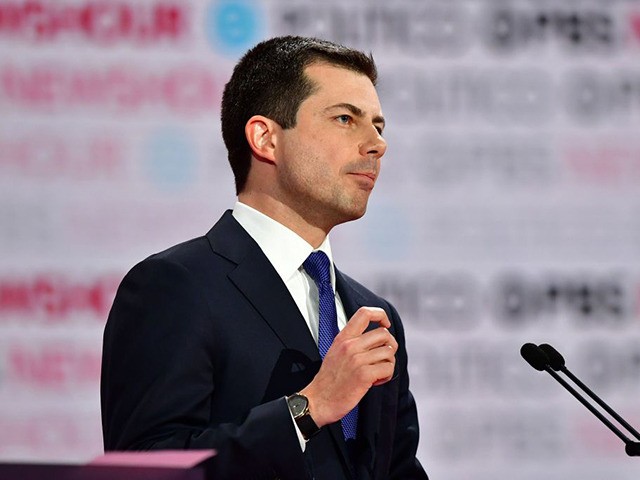Mayor Pete Buttigieg accused President Donald Trump of being “silent” in the face of atrocities committed by the communist government of China during Thursday night’s Democrat presidential debate, hosted by PBS.
Buttigieg asserted that he would adopt a more aggressive approach against China by threatening to lead an “isolation” of the Chinese regime from the free world and accused Trump of selling complacency to dictatorships. He specifically accused Trump of being silent in the face of China imprisoning millions of Muslim ethnic minorities, mostly Uyghurs in concentration camps, and failing to properly support the anti-communist movement in Hong Kong.
In reality, Trump’s State Department was among the first government agencies to expose intensifying abuses against Uyghurs in their native Xinjiang province, and Trump recently signed a bill into law that would shut Hong Kong out of the American economy in the event of intensifying human rights abuses by China.
Thousands of people in Hong Kong took to the streets for a “Thanksgiving” rally in the aftermath of that signature, many holding up photos of Trump in gratitude.
Buttigieg, the mayor of South Bend, Indiana, lambasted Trump in response to the question, “Should the U.S. do more than protest and issue sanctions?”
“Any tool ought to be on the table,” he replied, including boycotting the 2022 Winter Olympic Games, hosted by Beijing.
“For the president to let it be known that his silence — whether it’s on the rounding up of Muslim Uyghurs in Xinjiang, where they are putting them into camps, or the aspirations of the people of Hong Kong for democracy — for him to let China know that his silence can be purchased is trashing American values,” Buttigieg said. “The reality is that there’s a lot more to the relationship with China than who is selling more dishwashers.”
“Yes, we need a much smarter trade policy. We also have to acknowledge what is going on over there: the use of technology for the perfection of dictatorship. That is going to require a stronger-than-ever response from the U.S. in defense of democracy,” he continued. “But when folks out there standing up for democracy hear not a peep from the president of the United States, what message is that sending to the Chinese Communist Party?”
“The message I will send,” he promised, “is that if they perpetrate a repeat of anything like Tiananmen Square when it comes to Hong Kong, they will be isolated from the free world and we will lead that isolation diplomatically and economically.”
Trump has largely abstained from condemnation of China on its violent response to peaceful protests for democracy in Hong Kong, emphasizing his “friendship” with brutal dictator Xi Jinping.
He has also explicitly said, “I stand with Hong Kong, and I stand for freedom,” and revealed that he had privately warned Xi of economic consequences if he used deadly violence against protesters in Hong Kong.
More significantly, he signed the Hong Kong Human Rights and Democracy Act into law, which contains safeguards for Hong Kong protesters seeking U.S. visas. The act also requires the State Department to issue an annual review of human rights in Hong Kong and, if the government is found to be repressing its citizens, Hong Kong will lose its special trade status, significantly damaging the city’s economy.
The protesters of Hong Kong — who are seeking, among other demands, the right to elect their own lawmakers and an independent investigation into police brutality — took to the streets on Thanksgiving, the day after Trump signed the bill, to thank him, holding up printed out images of the doctored photo Trump tweeted that weekend of himself superimposed on the fictional boxer Rocky Balboa. Prominent Hong Kong civil rights activists had spent months urging such legislation, some traveling to Washington to make their case.
On the issue of China’s Xinjiang concentration camps, the State Department issued a warning of severe human rights violations against Uyghurs as early as April 2018, when it warned that Uyghurs were facing significant repression for much of 2017. Trump welcomed Uyghur victims of Chinese human rights abuses to the White House this year.

COMMENTS
Please let us know if you're having issues with commenting.